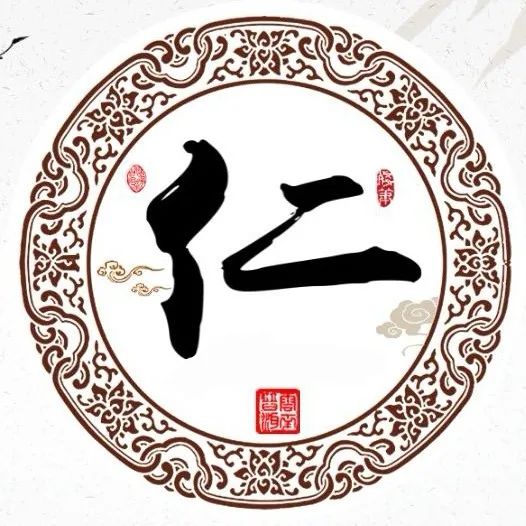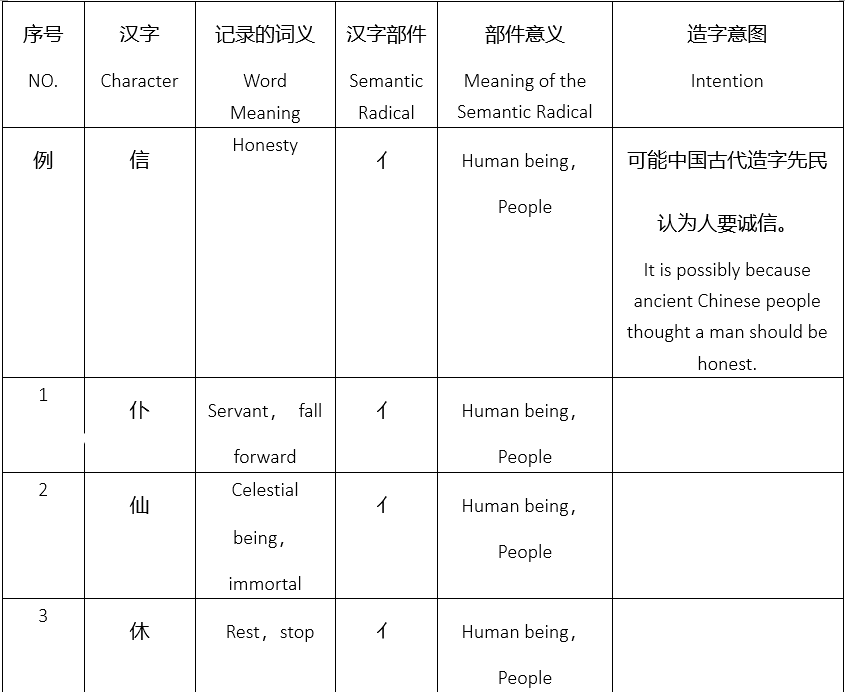以字带路
When Chinese character
meets the Silk Road
致力于汉字文化的海外推广

以字带路:
我们希望能通过讲解一个词,一个汉字的方式,展现汉语的魅力。
We hope to show the charm of Chinese by explaining one word or one character.
第四讲


仁[rén]
01
“仁”的字形

解读“仁”字
甲骨文
金文
小篆
楷书

仁的笔画
仁字是一个会意字,从人从二,左边是“人”,右边是“二”,这个“二”是一个重文符号,也即是说“仁”表示两个“人”的重复。与它的字形相对应的,无论是“仁”的本义还是引申义,都与人和人之间的关系有关。“仁”的本义是亲,指人与人之间相互亲爱,最初指人与子女之间的亲情关系,后来引申为博爱。
“仁”is a Pictographic character.
It is composed of “person” and “二”.
“二” is a symbol of redeption, which means “仁” is made up of two “person”. Based on this character, the original meaning and the extended meaning of benevolence are all related to the relationship between people and others. The original meaning of benevolence is “closeness”, refers to the mutual love between people, originally refers to the family relationship between people and their children, and later extended to fraternity.
常用词:
【仁爱】(rén’ài)
同情、爱护和帮助人的思想感情
benevolence;humanity
使用示例:
在儒家看来,人虽然有差等,但
仁爱
却是普世的,它是构建和谐、友善社会的基础和目标。
Confucianism believed that love could be extended to people in a certain order, but that benevolence has universal value, which is both the foundation and the goal of building a harmonious and good-will society.

02
“仁”的含义
“仁”的基本含义是爱人,进而达到人与人之间、天地万物之间一体的状态。
儒家将“仁”作为最高的道德准则,并将“仁”理解为有差等的爱,即爱人以孝父母敬兄长为先,进而关爱其他家族成员,最终扩大为对天下之人的博爱。
The basic meaning of the term is love for others. Its extended meaning refers to the state of harmony among people, and the unity of all things under heaven.
Confucianism holds ren as the highest moral principle. Ren is taken as love in the order of first showing filial piety to one’s parents and elder brothers, and then extending love and care to other members of the family, and eventually to everyone else under heaven.

大体上说,“仁”有如下三重含义:
ren has the following three implications:
1. 指恻隐之心或良心
compassion or conscience
2. 指根源于父子兄弟关系基础上的亲亲之德
virtue of respect built upon the relationship between fathers and sons and among brothers
3. 指天地万物一体的状态和境界。
the unity of all things under heaven
03
“仁者”到底是怎样的人?
“仁”的内涵是说不尽的,作为孔子思想的核心之一,“仁”与“礼”一起建构起了儒家的思想体系,影响着世世代代中国人的价值观念,它可以是善、可以是信、可以是义,但它又不仅仅是上面这些所可以概括的。尽管如此,这一概念的提出本质上是倡导人与人关系的和谐,是倡导人人都能为仁,成为“仁者”。那么“仁者”到底?从中国的几句古语中,我们便能够清楚地看到所谓“仁者”的形象。
The connotation of benevolence is indescribable. As one of the core of Confucius’ thoughts, Benevolence together with courtesy construct the Confucian ideology, influenced generations of Chinese values.It can be “goodness”,can be “intergrety”,can be “righteous”. But the connotation of benevolence is more than that.Besides, The essential purpose of putting forward this concept is to advocate the harmony between people,while proposing everyone can be benevolent .So ,what kind of person can be called “benevolent”? From a few ancient Chinese sayings, we can clearly see the image of the so-called benevolent.

第一句古语是“仁者爱人”。这句话的意思是仁者对他人充满仁爱之心。因此,对他人充满仁爱之心是“仁者”的一个特质。
The first saying is:”The Benevolent Person Loves Others”. The benevolent person has a loving heart. It is one of the qualities of a benevolent person to have compassion for others
第二句古语是“仁者自爱。”这句话的意思是有仁德的人珍爱自己,只有先自爱,才能推己及人,能够去爱人,也才能够赢得别人的爱,由此构成人与人之间爱的循环。因此,自尊自立也是“仁者”的特质之一。
The second saying is:”A Man of Benevolence Cherishes Himself”. A man of benevolence is sure to cherish himself and then extend his love to others. In return, he is sure to win love from others. Therefore, self-respect is also one of the characteristics of benevolent people.

第三句古语是“仁者无敌”。这句话的意思是具有仁德的人是无敌于天下的,“仁者”指具有“仁德”的君主或施行仁政的国家。国家强盛的深厚源泉,在于赢得民心;只有善待百姓,才能获取这一源泉,充满力量。
The third saying is”The Benevolent Person Is Invincible”. The benevolent refers to a ruler who has the virtue of benevolence or to a state with benevolent rule. The underlying principle is that a state’s source of strength lies in winning the hearts and minds of its people; if only the people are cared for, will the state be able to draw strength from this source and become powerful.

最后一句古语是“仁者乐山,智者乐水”。这句话的意思是有德行的人喜爱山,有智慧的人喜爱水。山崇高持固,以其深厚而滋养万物,仁者由此联想到平和安静、心怀仁德而欣喜;水奔流不息,以其顺势而周流无滞,智者由此联想到顺势而动、随时应变而快乐。此二句互文见义:仁爱而有智慧的人从自然山水中看到自己的天性和追求,乃至看到自己精神的映照,所以见山水而欣悦。因此,德也是“仁者”的一个重要特质。
The last saying is:”The Virtuous Love Mountains and the Wise Love Waters. “According to this term, a mountain is lofty and steadfast, conserving everything with its infinite forbearance. Thus, a virtuous man feels elated by associating this with poise, serenity and benevolence. Water, on the other hand, runs on incessantly, finding its way around without being deterred by any obstacle. Thus, a wise man feels joyful recalling how water meanders its course and keeps pace with the seasons. These two statements complement each other in meaning. Benevolent and wise people note their own nature and aptitude, even their own spiritual state of being, through mountains and water, hence their happiness at the sight of natural scenery.Therefore, virtue is also an important characteristic of a benevolent person.
“仁”的意义与“亻”有关系,这体现了中国古代先民造字、构字的智慧。你能根据汉字所记录的词义及其形旁“亻”,分析出中国古代人的造字意图吗?
The meaning of “Ren” is related to “人”, which reflects the wisdom of ancient Chinese people in making characters. Can you analyze the intention of ancient Chinese people in making words according to the recorded meanings of Chinese characters beasd on “亻” ?

图文编辑 | 李烨-Elivia、关聿彤-Clement
赵英同-Yingtong Zhao
指导教师 | 高亚楠-Gloria、刘宏飞-Victor